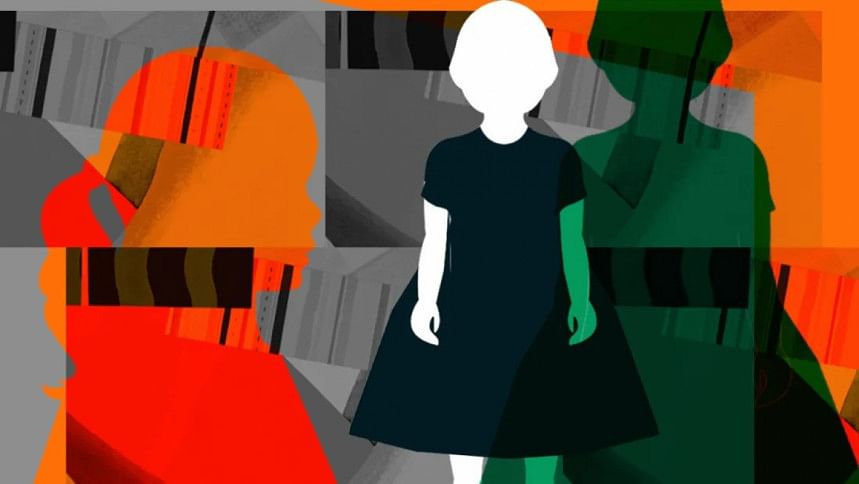Nearly 9 out of 10 victims of rape were children

Khuki (not her real name) was just three years old -- too young to grasp the gravity of the crime committed against her, or the extent of the harm it caused.
But the trauma left her little body trembling.
"She's afraid of her own father and brothers now," said Khuki's mother, her voice cracking. "We had to move to a new home upon the doctor's advice. But she is still in constant fear."
Now under psychiatric care, the child is slowly being reintroduced to play and social interaction by her mother.
On a quiet afternoon in early March, Khuki had gone downstairs -- as she often did -- to buy chocolates from the shop below her home in Moulvibazar.
When she did not return on time, her mother went looking for her and caught the 18-year-old shopkeeper in the act of raping her daughter.
Khuki's mother, a former nurse, has since left her job to provide full-time care. Despite the accused's arrest, the family continues to face pressure to settle the case in exchange for money.
Khuki's story is one of many in a growing epidemic of child rape in Bangladesh.
Between January and April this year, 87.56 percent of reported rape victims with known ages were children aged zero to 18 -- nearly nine out of 10 victims -- according to the latest data from Ain o Salish Kendra (ASK).
Of 342 rape cases reported during this period, age data was available for 201 victims. Of them, 176 were minors: 40 were aged between zero and six; 65 between seven and 12; and 71 between 13 and 18.
ASK classifies children under the legal definition provided by the Children Act-1974 and the Children Act-2013 -- anyone up to the age of 18. Age zero means a child under the age of one.
The pattern is similarly grim in gang rape cases.
Of 84 reported incidents, age data was available for 32 victims -- 20 of whom were minors, including one under six.
Attempted rape figures also reflect the severity of the crisis. Of 85 cases, 78 victims -- 91.76 percent -- were children, with 25 under the age of seven.
According to Bangladesh Mahila Parishad's monthly media-monitoring report, 389 rape incidents were reported in the first quarter of this year, with 72 percent of the victims aged between zero and 18.
Similarly, of 91 gang rape cases, 51 -- or 56 percent -- involved minors.
The report also noted a sharp spike in rape incidents in March, which saw 163 reported cases, including 125 (nearly 77 percent) involving minors. In April, 111 cases were reported -- 83 of them (72 percent) involved children.
Additionally, ASK data showed that Dhaka topped the list of reported incidents, with 45 cases, followed by Gazipur (20) and Narayanganj (17).
Clinical psychologist Ismat Jahan, head of the National Trauma Counselling Centre, confirmed the growing trend. "Many of our regional centres are seeing more cases [of child rape]."
She highlighted the long-term psychological impact on children -- depression, post-traumatic stress disorder (PTSD), and suicidal tendencies.
"Children re-experience trauma repeatedly during investigations and court proceedings. Many lose the ability to trust and later struggle with relationships. Some engage in self-destructive behaviour or risky activities in adolescence."
In March, leading rights organisations including ASK, Breaking the Silence, Manusher Jonno Foundation, Plan International Bangladesh, and Save the Children jointly condemned the rise in child sexual abuse.
They warned that the trend reflects deep-rooted vulnerabilities and threatens the nation's moral and constitutional fabric.
Following the widely discussed rape and murder of an eight-year-old girl in Magura, the government amended the Nari o Shishu Nirjatan Daman Ain (Women and Children Repression Prevention Act), reducing the investigation period from 30 to 15 days and the trial period from 180 to 90 days.
A provision was also introduced for special tribunals to try child rape cases separately.
However, rights activists criticised the reactive approach.
Khushi Kabir, coordinator of Nijera Kori, said, "This is not just a legal failure -- it's a societal collapse. Men don't even see girls as children anymore. Until that mindset changes, no law will fix this."
Fauzia Moslem, president of Bangladesh Mahila Parishad, called the crisis a "social disease". "Without self-realisation, no law will prevent such brutality."
Supreme Court lawyer Barrister Jyotirmoy Barua criticised the government's overreliance on punitive legislation.
"Harsh laws alone won't solve this problem. In fact, they may worsen it -- murders following rape have increased since the death penalty was introduced. That law was rushed to pacify public outrage. What we need is rational legislation and social awareness.
"The government must address root causes and take measures such as introducing self-protection education for girls from an early age and raising awareness in uneducated communities across the country. This isn't solely the state's responsibility -- we all have a role to play in tackling this crisis."
At a press conference in March, the aforementioned rights groups made several proposals, including the formation of a dedicated Child Affairs Directorate -- similar to the Department of Women's Affairs -- to coordinate inter-ministerial protection efforts.
They also urged a range of reforms, including taking steps to break families' silence regarding cases of abuse, strictly enforcing child protection laws, introducing school-based safety training, improving mental health and rehabilitation services, and ensuring stronger police accountability.
Further recommendations included community engagement involving parents, teachers and local leaders; strengthened victim support including legal aid and witness protection; and operational child help desks in all police stations.
To improve emergency response, they proposed streamlining national helplines -- 109, 1098, and the police headquarters hotlines -- to reduce confusion and ensure regular, transparent reporting on complaints and follow-up actions.


 For all latest news, follow The Daily Star's Google News channel.
For all latest news, follow The Daily Star's Google News channel. 



Comments